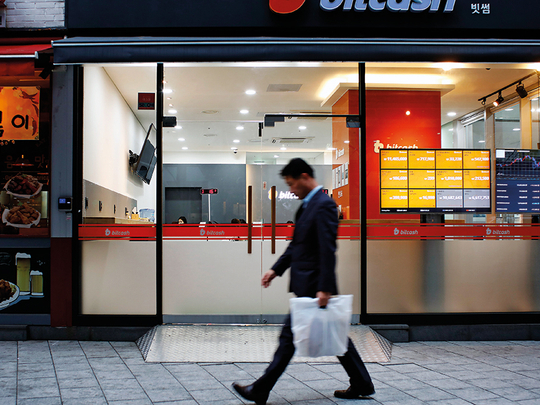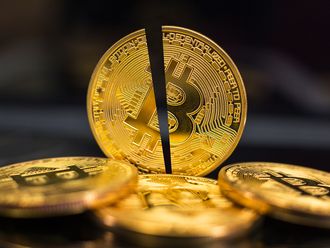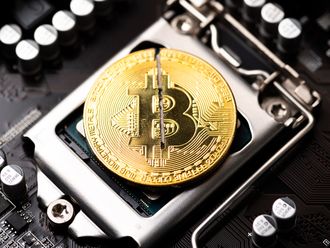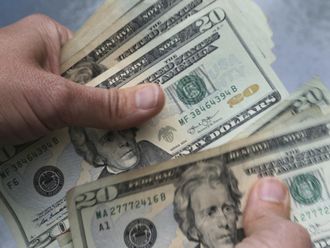
SAN FRANCISCO
The virtual currency boom has become so heated that it is throwing the list of the world’s richest people into disarray.
Consider what has happened to the founders of an upstart virtual currency known as Ripple, which has seen its value skyrocket in recent weeks.
At one point last week on Thursday, Chris Larsen, a Ripple co-founder who is also the largest holder of Ripple tokens, was worth more than $59 billion, according to figures from Forbes. That would have briefly vaulted Larsen ahead of Facebook chief executive Mark Zuckerberg into fifth place on the Forbes list of the world’s richest people.
Other top Ripple holders would have also zoomed up that list as the value of their tokens soared more than 100 per cent during the last week — and more than 30,000 per cent in the last year. The boom has turned Ripple into the second largest virtual currency, within striking distance of the original behemoth, bitcoin.
The explosion in Ripple’s value over the past month is the starkest illustration yet of how the mania around bitcoin has spilt over into a broader universe of virtual currencies. These coins — with names like Cardano, Stellar and Iota — are generally new twists on the bitcoin technology, which uses a decentralised network of volunteer computers to keep a record, known as a blockchain, of all transactions.
While most of these currencies were worth nearly nothing a year ago, many are now responsible for creating billionaires — albeit with rapidly fluctuating fortunes. If this is a tulip fever, the fever has spread to chrysanthemums and poppies.
Larsen’s soaring wealth sparked a few congratulatory messages on Twitter on Thursday, even if the value of Ripple — and his Forbes ranking — dropped later in the day. But his net worth, and the ballooning value of Ripple tokens, mostly drew comments about the irrationality of the virtual currency markets, which appear to be largely driven these days by the fear of missing out, or FOMO.
“This is beyond insane,” said Jeremy Gardner, an investor who previously worked at the virtual currency hedge fund Blockchain Capital, which invested in Ripple. “There’s absolutely nothing driving this rally except rampant FOMO, misinformation and speculation.”
Ripple, whose tokens are known as XRP, is far from the only virtual currency being fuelled by the hysteria. In 2017, there were 29 tokens — including Einsteinium and Byteball — that rose more than bitcoin’s remarkable 1,600 per cent jump, according to OnChainFx, a data provider.
Nearly 40 virtual currencies are worth more than $1 billion — when all the outstanding tokens are counted at their current value — despite many of them not having been used in any sort of transaction other than speculative trading.
Against this backdrop, Ripple could be considered a staid institution, though one with a colourful history.
Ripple was invented in 2012 by Jed McCaleb, a programmer who had created Mt. Gox, a bitcoin exchange that later dissolved in disgrace. McCaleb designed Ripple as a faster and more efficient version of bitcoin, without the mining process that bitcoin uses to distribute new coins and secure the network.
Larsen joined McCaleb early on to create a company, also known as Ripple. The company helped develop an open source Ripple software that makes it possible to move money between digital wallets. The Ripple token is one of the currencies that can be transferred with the software.
Fortunes not durable
Yet the fortunes of McCaleb and Larsen are not nearly as durable as those of other people on the Forbes list given that the value of virtual currencies fluctuates wildly. If Larsen wanted to access his wealth by selling Ripple tokens for dollars, it would likely drive down the value of Ripple tokens — and his riches.
McCaleb and Larsen did not respond to questions about the recent price increases.
Larsen was Ripple’s chief executive from 2012 until he stepped down last year to become the company’s executive chairman. During his tenure, Ripple focused on helping banks use its software to shift money between different foreign currencies, something that most banks do through a cumbersome process involving separate accounts in every country where they operate.
Ripple has said it has signed up more than 100 banks to use the company’s technology, including American Express and Banco Santander.
But banks do not need to use Ripple tokens for Ripple’s software to transfer dollars, euros and yen. That point appears to be lost on many small investors who are buying Ripple tokens.
Most of the buying and selling of Ripple tokens is happening in South Korea, according to data providers that track virtual currency exchanges, where ordinary investors have thrown money at a wide array of virtual currencies.
Several virtual currency hedge fund investors said that they have talked to banks and heard about interest in Ripple’s software, but not its tokens.
“I’m not aware of banks using or planning to use the XRP token at the scale of tens of billions of dollars necessary to support XRP’s valuation,” said Ari Paul, a co-founder of the hedge fund BlockTower Capital.
Ripple has so far announced that one company, a Mexican money-transfer business, is planning to use the Ripple token.
Still, even virtual currency analysts who believe in Ripple’s software have said there is a big difference between Ripple the company being successful, and Ripple the token gaining enough traction to justify current prices.
“An impossibly long list of things already needs to go right for XRP to become a reserve currency for banks,” Ryan Selkis, a virtual currency analyst, wrote in a post Thursday.
But, Selkis added, that doesn’t mean Ripple’s price won’t keep ascending. Why? “Because this is crypto, and everyone in the industry is now slinging crack crypto cocaine to retail addicts,” he wrote.
Zuckerberg says Facebook to look into cryptocurrency
NEW YORK: Facebook Inc. Chief Executive Officer Mark Zuckerberg gave cryptocurrency enthusiasts a little optimism for the new year.
Zuckerberg referenced cryptocurrencies in a posting last week in which he laid out how he will spend 2018 trying to correct persistent problems -”- including the proliferation of hate speech and misinformation -”- that have dogged his wildly popular social network for the past two years.
“There are important counter-trends to this — encryption and cryptocurrency — that take power from centralised systems and put it back into people’s hands,” Zuckerberg wrote. “But they come with the risk of being harder to control. I’m interested to go deeper and study the positive and negative aspects of these technologies, and how best to use them in our services.”
What all this may mean for the digital currency world remains to be seen.
— Bloomberg












